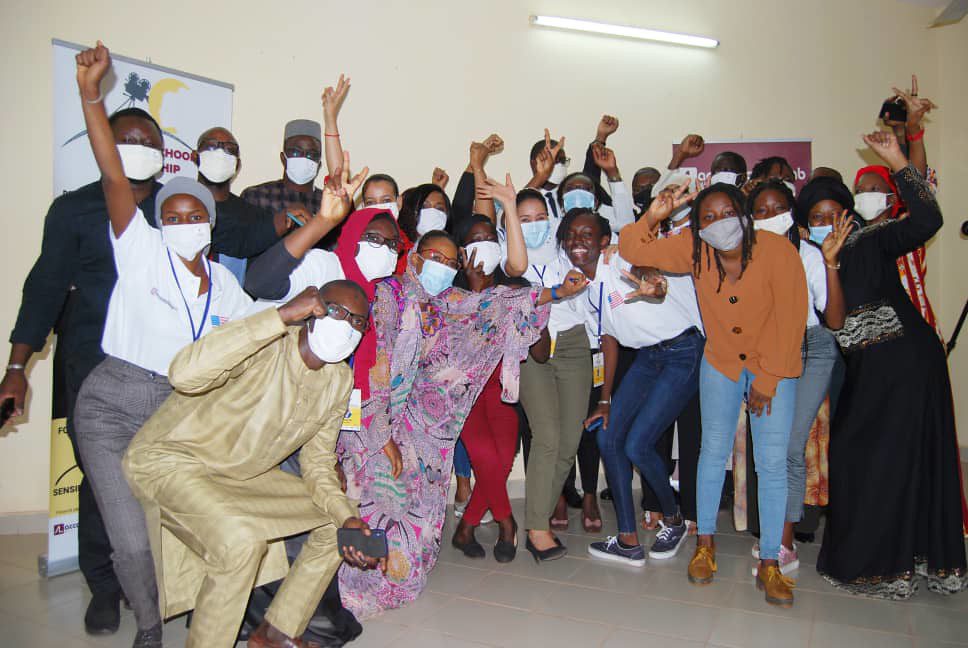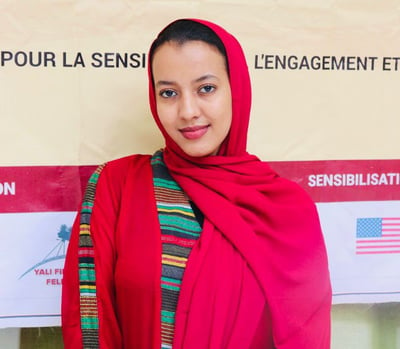NEWS
February 27, 2023

IN BRIEF
By Zeina Walet I am Zeinabou Walet Mohamed Ali, a young woman with a passion for women’s empowerment and youth leadership, which I explore in the different communities I work with in Mali. Originally from the region of Timbuktu, I have been immersed in the realities and needs of these communities as I traveled all over the country. My journeys have taken me all the way up to the refugee camp of Mberra in Mauritania, and I have been aware of the challenges faced by these populations since my youth. Among these is the lack of women’s participation in democratic [...]
SHARE
By Zeina Walet

I am Zeinabou Walet Mohamed Ali, a young woman with a passion for women’s empowerment and youth leadership, which I explore in the different communities I work with in Mali. Originally from the region of Timbuktu, I have been immersed in the realities and needs of these communities as I traveled all over the country. My journeys have taken me all the way up to the refugee camp of Mberra in Mauritania, and I have been aware of the challenges faced by these populations since my youth. Among these is the lack of women’s participation in democratic decision-making processes at local levels. I must acknowledge that I have had a relatively privileged background compared to many other women who were born into circumstances that made their futures dark and uncertain.
My involvement in this field began in primary school and intensified during my university years when I spent most of my time volunteering in associations that defended causes that were close to my heart. My level of commitment was so strong that I had never been involved in a cause that didn’t reflect the same values I hold.

That is how I joined the Lab team as the Project Manager of Reel Change: The YALI Women’s Responsible Leadership Film Fellowship in Mali and Niger. I am also an alumnus of the Young African Leaders Initiative-YALI!
Click here to see the films from Mali and Niger
This fellowship was initiated to address the lack of accountable leadership at the heart of the challenges facing youth in Mali and Niger. When young people do not understand their rights and responsibilities, they are unable to participate in democratic systems, hold their governments accountable, or build the societies they want to live in. This leads to the violence, poverty, and exclusion that we continue to see. This is particularly the case for women, whose voices are rarely heard in any meaningful way, who are systematically excluded from decision-making, and who are often denied access to positions of power. The films are the perfect tool for awareness, engagement, and advocacy, as the stories can be compelling.
The objective of the project was to contribute to the improvement of policies and practices through the use of short films as tools for awareness-raising and advocacy. This project allowed 20 young women from Mali and Niger to make inspiring short films to raise awareness among the population and authorities on the issues facing their communities, with the aim of bringing about positive behavioral change.
After a rigorous selection process, 20 young women from both countries were selected to receive the film fellowship. We were looking for qualified young women with significant impact and influence in their communities that would allow them to further the advocacy and awareness-raising activities planned by the project. Since this was a project that had to cover both countries, we tried to have a significant representation in the regions. One of the important criteria that also weighed on the selection process was the relevance of the themes proposed by these young women. It was important for us to have a wide range of themes that deal with different issues.
This selection allowed us to become aware of the multiplicity of problems that our communities can face and especially of the diversity of our countries, and to take into account the context of each locality which differs from one area to another.
Among the 20 young women selected in Mali, five are from Bamako, five others are from the regions in Niger, eight are from Niamey, one is from Maradi, and one is from Tillabery. After the selection process, the fellows received training on accountability, responsible leadership, and digital communication, in addition to technical training on production by a team of experts in the field.
In Mali, this training was marked by the intervention of Mbaranga Gasarabwe, Deputy Special Representative of the United Nations Multidimensional Integrated Stabilization Mission in Mali (MINUSMA), at the closing of the training. On March 25, 2021, the U.S. Embassy in Mali hosted a Breakfast at the American Club in honor of the Fellows. It was an opportunity for the fellows to share their stories, short films, and motivations with the Minister for the Promotion of Women, Children, and the Family, who showed great interest in the project and expressed her admiration for the themes presented. The First Counselor of the Embassy was present and spoke about the U.S. government’s support for a more egalitarian and inclusive world.

Filming and production of the films began in March and continued through April. May and June were devoted to post-production and editing of the short films.
The themes around which the discussions and screenings were dealt mostly with issues of women’s rights, child protection, education, and climate justice.
Screenings allowed the young women directors to use their voices to raise awareness among the populations of their localities on important issues affecting their daily lives. They were also able to lead debates as speakers and moderators, with the panelists invited for each screening. In general, we found that each of the localities in Mali had its own specific realities, whether it be problems of insecurity, mobilization, or social and cultural realities.

In Niger, several people testified by sharing similar stories of social pressure related to the different themes of the films. They encourage parents, girls, society, and authorities to be aware of certain socio-cultural dangers. Most of the films correspond to stereotypes experienced by women in Niger.
It can be said that this project has developed and strengthened the skills and analytical abilities of the fellows by enabling them to write scripts on different themes and produce inspiring short films. The young women filmmakers used their voices to raise awareness in their communities about the issues they face on a daily basis. We feel that the authorities, community leaders, women, and youth have become aware of the importance of certain issues by participating in the discussions and taking actions for positive change in different situations. Several of these films have participated in international festivals and have won prizes, too!
- The film “My passion” – directed by Djelika Mama Traoré – won the 1st prize at the International Festival Clap Ivoire in Côte d’Ivoire in 2021. She also participated in the Cannes Film Festival 2022 in France.
- In Niger, the film “The pages of my life,” directed by Oumarou Garba Maimouna, and the film “The beauty of the night,” directed by Balkissa Kassoukoye, have won complete production kits of 15. 000 euros offered by UN Women.
- Some Fellows in Niger also participated in the Fespaco in 2022 and in the Festival Cinebanlieue in Dakar.
- The film “l’autisme: Un handicap invisible,” directed by Aissata Ouattara, was broadcasted on the national Malian channel ORTM during the international day of autism.
- The ten short films in Mali have been screened in Timbuktu for two days thanks to the support of the Minusma and its Gender Unit.

It has been a real privilege and an honor to be in charge of a program that puts women in the spotlight by allowing them to make their voices heard through the medium of film. This project was supported by the U.S. Department of State through the U.S. embassy in Mali. Being part of it showed how much we need to encourage the rise of women in every possible field. Being around these dedicated young ladies has made me realize that there is no limit to what we can accomplish.
I can say that this project allowed me to learn a little more about my beautiful country; it made me discover the multiplicity and richness of our country. It helped me discover areas with different realities, but each one is beautiful in its own way. Above all, I learned about several important issues that our communities are facing. I particularly appreciated the resilience and activism of women in areas such as Koutiala and Yanfolila, where local and traditional methods are being used by these women to remain active and take the lead to assert their rights.

I have seen that in Timbuktu, despite the undeniable weight of tradition and culture, parents remain convinced that an inclusive education is the best way to ensure a better future for their daughters. It is unfortunate to note that certain advances cannot be achieved without the stability of certain areas currently weakened by the threat of terrorism. In some parts of Timbuktu, schools can’t open out of fear of being targeted by terrorist groups that are against educating girls.
Another issue that’s come up is emigration from Niger. However, growing young people are becoming aware that the future is in Africa and that it is their duty to participate fully in the development of this continent. Being a country with a strongly patriarchal culture, the young filmmakers have also demonstrated that women in Niger are increasingly making their voices heard.
This project also allowed me to have a different reading of the lives of sex workers because, having had the opportunity to learn about their backgrounds, I realized just how much society is responsible for many of the misfortunes that affect humans. Unfortunately, there are not many structures that promote the integration of these young girls into society by providing them with adequate training and decent work. In Mali, women who work in the informal sector are generally marginalized, yet this work contributes to the economy and allows many families to make ends meet. It is a sector that deserves to be regulated.

Other film topics related to recycling and health. When we talk about women’s garbage collectors in our cities, what comes to mind? A film showed how these women not only clean the streets but also recycle litter. They deserve more support. Meanwhile, autism is a disease that is unknown to many in Mali. Another film on this subject made us aware of the difficulties faced by autistic children and the pain that parents face, especially since it teaches us that there is no adequate assistance for these cases.
As a young woman, I remain convinced that we play a very important role in the evolution of our societies, and our voices are important. We need to stick together and make sure that we create an important network of women leaders who influence Africa and the world. Click here to see the films from Mali and Niger
*Zeina is the MEL & Communications Officer at Accountability Lab Mali and former Project Manager for the Reel Change: The YALI Women’s Responsible Leadership Film Fellowship in Mali and Niger.
